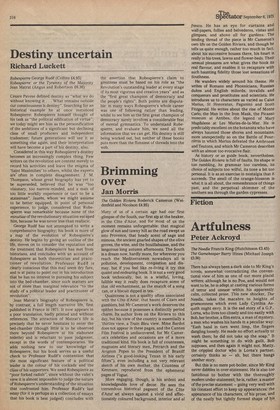Destiny uncertain
Richard Luckett
Robespierre George Rude (Collins £4.95) Robespierre: or the Tyranny of the Majority Jean Matrat (Angus and Robertson £6.30) Cesare Pavese defined destiny as "what we do Without knowing it . . . What remains outside Our consciousness is destiny". Searching for an historical example he at once instanced Robespierre: Robespierre himself thought of his task as "the political edification of virtue"; we today might see him as the personification of the ambitions of a significant but declining class of small producers and independent tradesmen; future generations will see it as something else again, and their interpretation will have become a part of his destiny, also.
Considered in this way Robespierre's destiny becomes an increasingly complex thing. Few writers on the revolution are content merely to record his activities and leave the enigma of 'Saint Maximilien' to others, whilst the experts are* often in complete disagreement. J. M. Thompson, whose great biography has yet to be superseded, believed that he was "too visionary, too narrow-minded, and a man of tOo little worldly experience or tact to be a statesman". Jaures, whom we might assume to be better equipped, in point of personal experience, to judge, considered that Robespierre was remarkable because .none of the minutiae of the revolutionary situation escaped him, because he was never less than realistic.
George Rude has not attempted to write a comprehensive biography; his book is more of a , map of the evolution of Robespierre's destiny. He begins by giving an outline of the life, moves on to consider the reputation and the treatment that Robespierre has met from historians, and concludes with an account of Robespierre as both theoretician and practitioner of revolution. Professor Rude is clearly conscious that this may, seem dry fare, and is at pains to point out in his introduction that he has no interest in pursuing his subject into the bed-chamber, since such matters are not of more than marginal relevance "to the study of a political leader and practitioner of revolution".
Jean Matrat's biography of Robespierre is, by contrast, a full length narrative life, first published in France in 1971. It now appears in a poor translation, badly printed and without references. The attraction of Matrat's life is precisely that he never hesitates to enter the bed-chamber (though little is to be observed there beyond Robespierre at his elaborate toilette) and is reluctant to pass judgment, except in the words of contemporaries. He adds nothing new to our knowledge of Robespierre, but his book serves as a useful check to Professor Rude's contention that the most significant feature of a political leader is the colour of his cockade and the class of his supporters. We need Robespierre as "Poor forked radish", since without the valet's view it is almost impossible to judge the nature of Robespierre's understanding of the situation that confronted him. Professor Rude's last essay (for it is perhaps as a collection of essays that his book is best judged) concludes with
the assertion that Robespierre's claim to greatness must be based on his role as "the Revolution's outstanding leader at every stage of its most vigorous and creative years" and as the "first great champion of democracy and the people's rights". Both points are disputable: in many ways Robespierre's whole career was one of following rather than leading, whilst to see him as the first great champion of democracy surely involves a considerable feat of mental gymnastics. To understand Robespierre, and evaluate him, we need all the information that we can get. His destiny is still being worked out, but neither of these books puts more than the flimsiest of threads into the web.


































 Previous page
Previous page